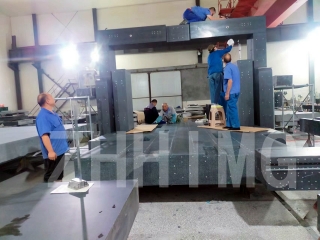Precision ceramic components:
High chemical stability: Precision ceramic materials are known for their excellent chemical stability, which can maintain the stability of their physical and chemical properties in a variety of harsh chemical environments. Ceramic materials usually have good corrosion resistance to corrosive substances such as acids, alkalis, and salts, which makes them perform well in highly corrosive media.
Oxidation resistance: At high temperatures, precision ceramic components can maintain their structural stability and are not prone to oxidation reactions. This characteristic makes precision ceramics have a significant advantage in high temperature, highly oxidizing environments.
Wide application: Due to its excellent chemical stability, precision ceramic components have a wide range of applications in chemical, energy, medical and other fields. For example, in the chemical industry, precision ceramics can be used to make corrosion-resistant reactors, pipes and valves. In the medical field, precision ceramics can be used to make artificial joints, dental repair materials and so on.
Precision granite components:
Relatively good chemical stability: Precision granite, as a natural stone, also has a certain chemical stability. However, compared with precision ceramics, its corrosion resistance may be slightly insufficient. In some strong acid, alkali or high salinity environments, granite may be subjected to a certain degree of erosion.
Limited application: Due to the relative lack of chemical stability, precision granite components may not be the best choice in some cases where chemical stability is required. For example, in the transport or storage of highly corrosive media, more chemically stable materials may be required.
Advantages of precision ceramic components
1. Stronger corrosion resistance: precision ceramic components have higher resistance to acid, alkali, salt and other corrosive substances, and can maintain their stability in a wider range of chemical environments.
2. Higher oxidation resistance: in high temperature environment, precision ceramics can maintain its structure stability, not easy to occur oxidation reaction, thus extending the service life.
3. Wider application fields: Due to its excellent chemical stability, precision ceramic components have a wide range of application prospects in many fields such as chemical industry, energy, and medical treatment.
In summary, from the point of view of chemical stability, precision ceramic components have stronger corrosion resistance and higher oxidation resistance than precision granite components, so they have significant advantages in some occasions where chemical stability is very high. These advantages make precision ceramic components widely used in many fields, and promote the development and innovation of related technologies.
Post time: Aug-05-2024

